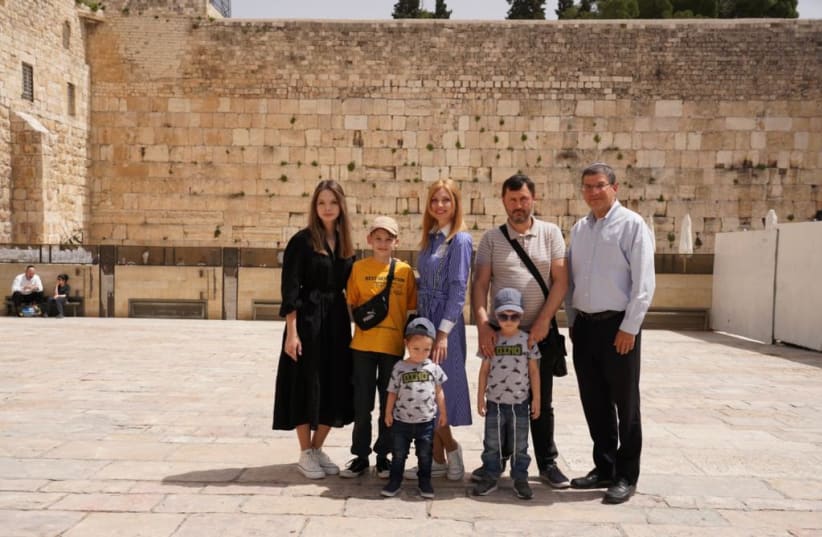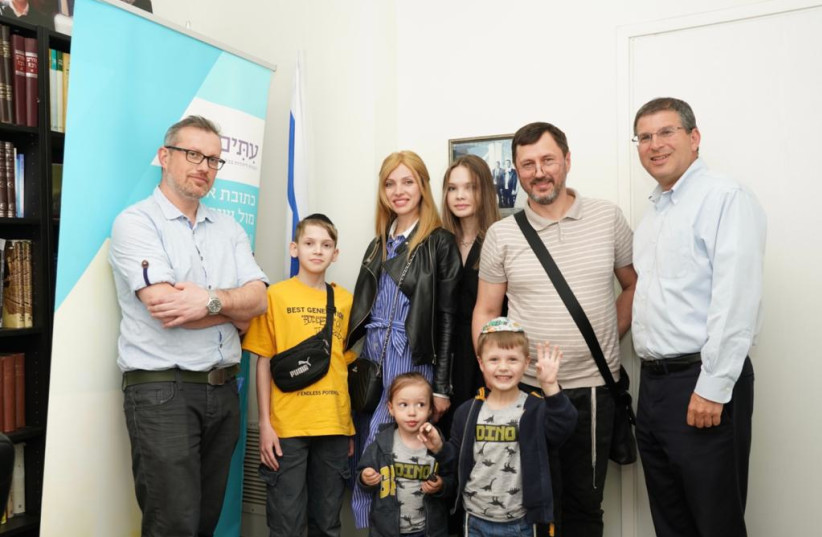Yael and Aaron Agpov look like your average Jewish Orthodox family: she wears a wig for reasons of modesty, he wears a kippah and tzitzit, and the children too are dressed as Orthodox Jews and live a religious lifestyle. But although they are refugees from Ukraine and finished their conversion process in January, the Israeli bureaucracy will not acknowledge them as Jews, and therefore they cannot make aliyah and become Israeli citizens.
Until the Itim organization assisted them, they could not enter or work in Israel. Now, slowly, they hope to become Israeli citizens and begin their lives as Jews in the Jewish state.
To be eligible to make aliyah, the Law of Return requires a person to have at least one Jewish grandparent. People who convert are only entitled to Israeli citizenship if they have lived in the Jewish community where they converted for at least nine months since the conversion took place.
The Agpov family completed their conversion process in January with Rabbi Yosef Hanoch Brodbecker, just weeks before the war broke out. An Orthodox rabbi from Kyiv, Brodbecker is the only rabbi in Ukraine whose conversion is acknowledged by the Chief Rabbinate.
The Agpovs lived in Dnipro’s Chabad community but with the outbreak of the war, most Jews left the central Ukraine riverside city and scattered to many countries. Israel did not consider the family to be eligible for aliyah, as they had not been part of a Jewish community for nine months since their conversion.
To make matters worse, they also will not be able to receive approval from the Jewish community in which they lived because it has dispersed.
The Agpovs approached the Itim organization in Israel, which helped them obtain temporary permits to enter Israel as tourists. With the help of Itim’s founder, Rabbi Seth Farber, they are staying in an apartment given to them temporarily by the Kehilat Netivot synagogue in Ra’anana. Members of the English-speaking community offered the Agpov family housing, food and clothing.
Although they are now temporarily sheltered and safe, their problems have just begun.
“My journey toward Judaism started about nine years ago,” Yael said through a translator. “I remember that as a child I heard that my grandmother on my father’s side was Jewish. My parents were divorced and I lived with my mother. We tried to trace the family roots but my dad passed away, and we had no way to find out about the family tree anymore. There was no proof that my grandmother was Jewish, but the idea that I had Jewish blood slowly became something I was fascinated about.”
Yael approached the Chabad Jewish community in Dnipro and started participating in events and holiday classes, and developed a relationship with the city’s chief rabbi, Rabbi Shmuel Kaminetzky, and with community members.
“I started studying and got to know my husband, who has no Jewish connection but was interested in learning and converting to Judaism – we converted six months ago,” said Yael, who has been going by her Jewish name since.
Since Kaminetzky’s rabbinic court had only been recognized by the Chief Rabbinate in 2022, they needed to convert with Rabbi Yosef Hanoch Brodbecker in Kyiv.
Most of their conversion process took place in Dnipro and they were in touch with Brodbecker via Zoom, Yael said. “We studied with him every evening, and he tested us via Zoom or when he came to visit Dnipro once a month.” The whole process took about three years.
Now they are dealing with the Interior Ministry, which will allow them to make aliyah after waiting the nine required months after their conversion – here in Israel, not where they converted.
“We are only assisting people who have Jewish parents or grandparents” the Agpov family was told in their many attempts to receive service from official Israeli organizations and government ministries. “Since we don’t have any first-degree relatives in Israel, it took a while – and help from the Itim organization – for us to get into Israel as refugees.”
Farber said that the Agpov family is finally beginning to get all of the official acknowledgments from the Israeli government.
“We have been working very well with the Interior Ministry and the Aliyah and Integration Ministry,” he said. “We hope they’ll be able to let them receive their aliyah funds even though they will only be considered Israeli citizens in a few months – when it will be nine months since they converted.
“The Chief Rabbinate employees have also been very helpful. They understand that the Agpovs fell between the cracks and cannot live in Dnipro for nine months – and are willing to acknowledge [their time with] our synagogue in Ra’anana as such.
“Agpov’s story may be exceptional, but it just emphasizes that there are other families in a similar situation who need our assistance.”

